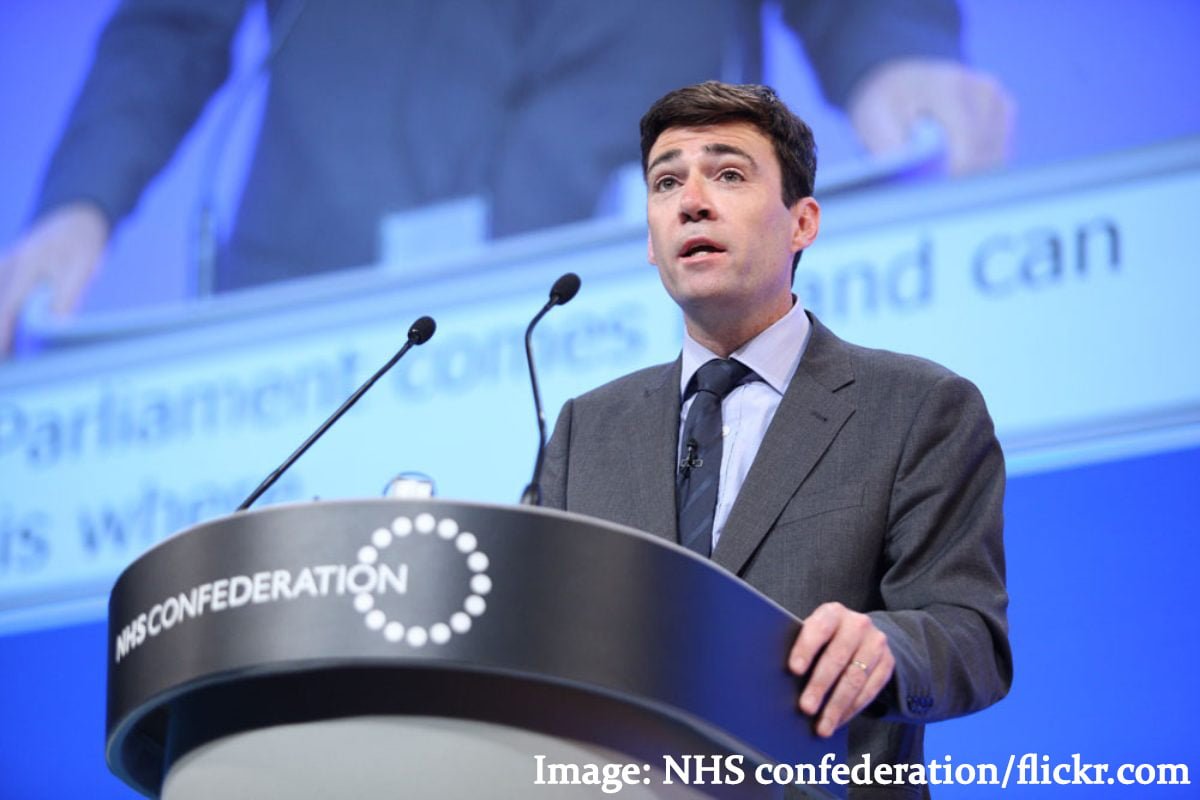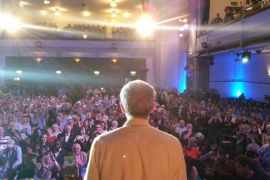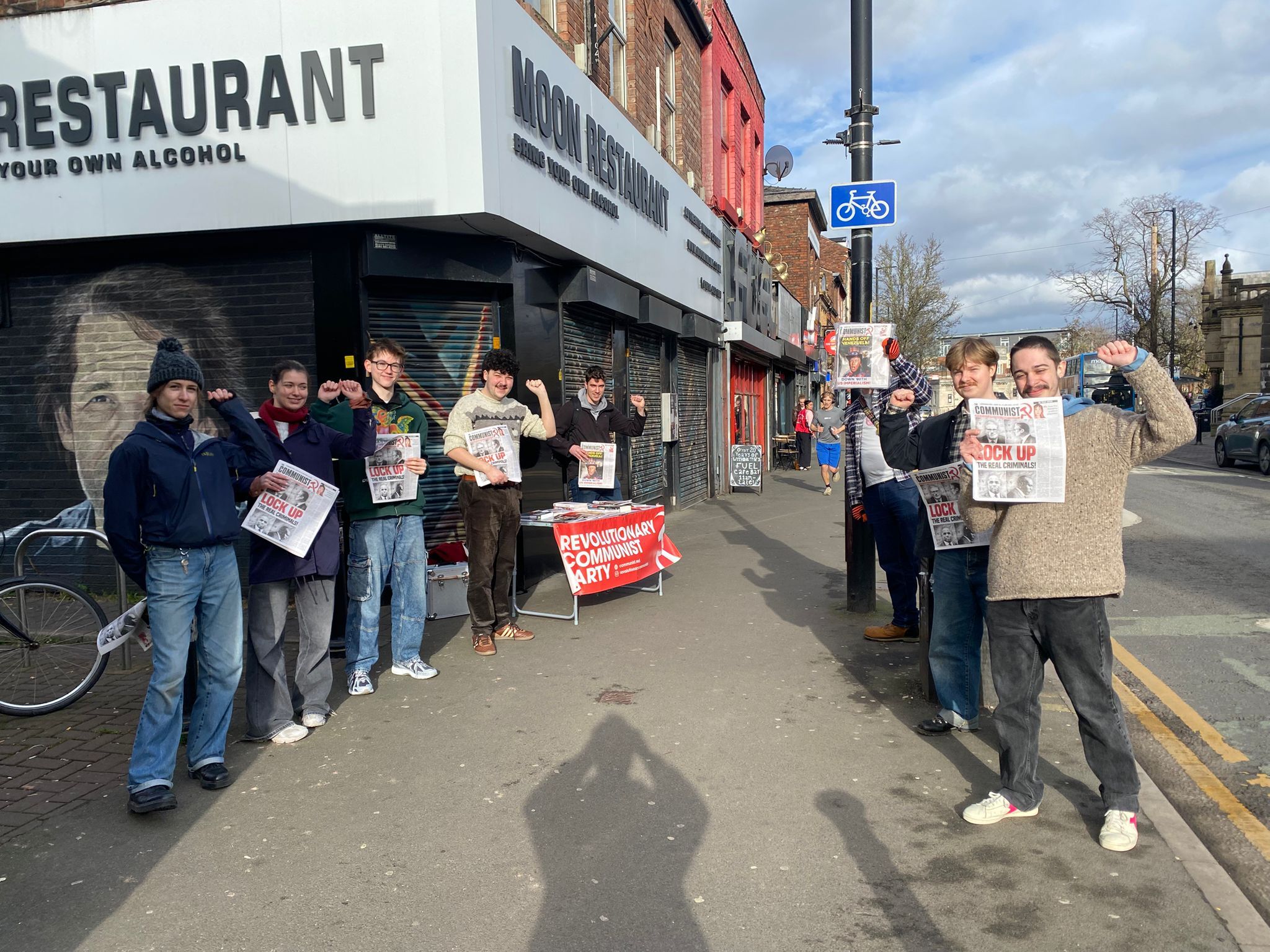To the dismay of the Establishment, a new opinion poll has suggested that the gap between Jeremy and his rivals is widening as the momentum behind the #JezWeCan movement grows. Meanwhile, in a desperate attempt to stop Corbyn, the Labour bureaucracy have launched a hysterical campaign to “root out” the “entryists” who are joining in order to vote for Jeremy.
To the shock, surprise, and dismay of the Establishment, a new opinion poll has suggested that – despite all of the recent attacks by the Blairites and the right-wing press – Jeremy Corbyn is pulling even further ahead in the Labour leadership contest. The gap between Jeremy and his triumvirate of right-wing rivals continues to widen as the momentum behind the #JezWeCan movement grows.
Meanwhile, in yet another desperate attempt to stop Corbyn, the Labour bureaucracy have launched a hysterical campaign to try and “root out” the “entryists” who are joining in order to vote for Jeremy. But these last-gasp efforts will do little to hold back the rising tide that is pushing Corbyn towards victory.
Every attempt to discredit Jeremy and his supporters has so far ended up backfiring. All the attacks by the Blairites only expose how out-of-touch these professional politicians are from the lives of ordinary people; how completely self-deluded these careerists and carpetbaggers are; how different a world they inhabit in their Westminster bubble and the ivory towers of Whitehall think tanks.
Rather than repelling people from the Corbyn campaign, the hysteria of the right-wing and the capitalist press has acted as free publicity, demonstrating the massive gulf that exists between Jeremy’s principled anti-austerity stance and the Tory-lite policies of the other contestants. Like Antaeus, the figure of ancient Greek myths who would defeat his enemies by gaining strength from the earth when thrown to the ground, the mass movement behind Jeremy only grows stronger with every attack by its opponents.
Surging ahead
 Whilst polling companies have hardly provided the most reliable or accurate predictions over the past year – failing to estimate the support for independence in the run up to the Scottish referendum; and making even more dramatically inaccurate predictions in advance of the May 2015 general election – the latest figures will nevertheless have been greeted with great concern by the right and delight by the left.
Whilst polling companies have hardly provided the most reliable or accurate predictions over the past year – failing to estimate the support for independence in the run up to the Scottish referendum; and making even more dramatically inaccurate predictions in advance of the May 2015 general election – the latest figures will nevertheless have been greeted with great concern by the right and delight by the left.
Previous polls from the end of July had put Jeremy ahead by a 22-point lead, with 42% of members, affiliates and registered supporters (known collectively as the “selectorate”) stating that they would vote for Corbyn. Now, only two weeks later, the gap between Corbyn and his nearest rival (Burham) has widened to 32 points. Furthermore, the latest YouGov survey indicates that the left-wing candidate could sweep to victory in the first round of voting, gaining 53% of first preferences.
In these latest figures, released just two days before the deadline for registration, Cooper falls closely behind Burnham (on 18% and 21% of first preferences respectively), whilst the arch-Blairite Kendall trails the pack on just 8%.
This news will have been met with horror by the Blairites, who were increasingly hoping that a Corbyn triumph could be avoided on the basis of second (and third) preference votes. Alastair Campbell, the New Labour spin doctor of the Blair years (upon whom the infamous Malcolm Tucker of satirical sitcom the Thick of It is based) had come out of political retirement this week on behalf of the “vote for anyone but Corbyn” campaign. Now, it seems, even that option is ruled out for the Labour right-wingers, with predictions that Jeremy would win an outright majority.
Commenting on the results of this latest survey, Peter Kellner, president of the YouGov polling company, told the Times newspaper, “I would personally be astonished if Mr Corbyn does not end up Labour’s leader.”
Who is supporting Corbyn?
 As well as petrifying the Establishment and providing a further encouraging boost to the Corbyn campaign, the YouGov figures provide an interesting breakdown of where Jeremy’s support is coming from, with the results broken down in such a way as to highlight the key to Corbyn’s success.
As well as petrifying the Establishment and providing a further encouraging boost to the Corbyn campaign, the YouGov figures provide an interesting breakdown of where Jeremy’s support is coming from, with the results broken down in such a way as to highlight the key to Corbyn’s success.
Firstly, it can be seen that whilst Jeremy has 53% of first preferences from across the selectorate, he is even further ahead amongst trade union affiliates and registered supporters (with 67% and 55% of first preferences respectively) than amongst Labour Party members (49% of first preferences). In a head-to-head race, Jeremy would absolutely smash his nearest rivals if the vote was restricted to trade union sign-ups, beating Burham 72-28 and Cooper 76-24.
| % of 1st preference votes | Total | Members | Trade union sign-ups | Registered supporters |
| Corbyn | 53 | 49 | 67 | 55 |
| Burnham | 21 | 22 | 14 | 24 |
| Cooper | 18 | 20 | 10 | 18 |
| Kendall | 8 | 9 | 8 | 4 |
Given that the former group have all signed up since the general election, this demonstrates that Corbyn’s support is primarily coming from the freshest layers of the movement – those newly brought into political activity and struggle since the Tories surprise victory in May, such as the hundreds of thousands of workers and youth who took part in the massive anti-austerity demo on 20th June.
Furthermore, this fresh influx of activists and supporters is no small change. 145,000 people have signed up as either affiliated or registered supporters since the election, divided between 80,000 from affiliated organisations (such as trade unions) and 65,000 registered supporters (who have payed £3 in order to vote in the Labour leadership elections). Given that the three right-wing candidates inspire about as much enthusiasm as a damp plank of wood, it is no stretch to suggest that the vast majority of these new supporters have signed up in order to join the ever growing #JezWeCan movement.
Added to this mass of new supporters are a further 79,000 new Labour Party members that have joined since the election. In total, therefore, the size of the Labour membership (including supporters) has more than doubled since the election, to a total “selectorate” of 425,000 (at the time of writing).
Interestingly, the YouGov figures also show the strength of support that the different candidates have amongst Labour members against the length of time these people have been members.
Again, it is clear from these results that Jeremy’s support is overwhelmingly from the freshest and newest layers. Whilst Jeremy receives 49% of first preferences amongst Labour Party members overall, this figure shoots up to 63% amongst those who have joined the Party since the May 2015 election. For those who joined under Miliband’s reign – 2010-15 – the relevant number is 52%. And amongst pre-Miliband members (i.e. those remaining in the party from the days of Blair and Brown) the figure falls to 39%.
Most interesting, if the vote were restricted to these more long-term Labour members, Corbyn would actually lose out in a head-to-head race against either Burnham or Cooper. By comparison, if the vote was only taken amongst post-general election Labour recruits, Corbyn would demolish both Burnham and Cooper (68-32 and 74-26 respectively).
| % of 1st preference votes | All members | Since General Election | Miliband Era (2010-2015) | Pre-Miliband |
| Corbyn | 49 | 63 | 52 | 39 |
| Burnham | 22 | 19 | 19 | 26 |
| Cooper | 20 | 12 | 19 | 25 |
| Kendall | 9 | 7 | 10 | 10 |
Although there has been a certain regeneration of the Labour Party, therefore, with many of the most careerist types in the party leaving since 2010, it is clear from the results that the right-wing of the Labour Party still has a certain base of support inside the Party itself.
This is also demonstrated by the nominations of support from local CLPs (constituency Labour parties). Whilst Jeremy has the backing from the most CLPs (with 152 out of 390 nominations, 39% of the total), Burnham and Cooper are not far behind, on 111 and 109 respectively (28% each). These latter (right-wing) candidates, therefore, still command around 56% of the support amongst existing active members within the Labour Party.
Whichever way one looks at it, it is clear that Corbyn’s massive support is primarily coming from outside of the Labour Party; or rather, from those who have only recently been drawn into activity and struggle as a result of the Tories’ victory, the subsequent wave of demonstrations, and from the semi-accidental emergence of a figure who could act as a lightning rod and a focal point for all this accumulated anger, radicalisation, and desire for change in society.
(As a P.S., it is interesting to see how the results of the YouGov poll break down by gender. Despite the attempts by Cooper and Kendall to appeal to women on the basis of gender, 61% of women in the selectorate say they will be backing Corbyn, compared to only 19% and 4% for the former two candidates. This demonstrates that female workers and youth are far less interested in the gender of their elected leadership, and much more interested in backing those who put forward and support progressive policies in general.)
Blairite mantra repeated
 With their chances of defeating Corbyn fair-and-square narrowing, the Blairites have ramped up their attacks in the media, with Blair, Mandelson, Alastair Campbell and others all adding their voices to the chorus of slurs and slander.
With their chances of defeating Corbyn fair-and-square narrowing, the Blairites have ramped up their attacks in the media, with Blair, Mandelson, Alastair Campbell and others all adding their voices to the chorus of slurs and slander.
The focal point of this impotent onslaught has been the idea that Corbyn, whilst overwhelmingly popular amongst the selectorate of Labour members and supporters, is “unelectable” amongst the wider electorate. All manner of lies, damn lies, and statistics are conjured up to support this tired mantra.
Most obvious and oft-repeated are the results of the general election, the logic being: the Tories won and UKIP gained votes – therefore, we need to be more like the Tories and UKIP! Such an assertion, however, could easily be turned on its head: Labour was demolished by the SNP in Scotland and lost votes to the Greens in England and Wales – therefore we need to emulate the anti-austerity promises of the SNP and the Greens. Meanwhile, the Blairites conveniently ignore the fact that only 24% of the eligible electorate actually voted for the Tories, and that the biggest winner was the “stay-at-home party” – i.e. those who abstained out of a disgust and lack of enthusiasm towards all the mainstream Westminster parties.
The subsequent assertion made is that Labour lost votes because it was “too left-wing”. The argument this time goes something like this: we won three elections under Blair, lost one under Brown, and lost another under Miliband; Blair was more right-wing and Miliband was more left-wing; therefore, we need more right-wing policies. Again, forget the fact that Labour actually gained votes in the 2015 election (despite the rout in Scotland) under Miliband – why let the facts ruin a good story!
More importantly, the Blairites again conveniently forget that the electorate now is not the same one as that during the Blair years. In that period, there was (credit-fuelled) economic growth and at least some genuine reforms on offer (alongside privatisations and wars). Today, we are living under the deepest crisis of capitalism in history – an endless crisis of a system that offers nothing but austerity and declining living standards. Could it perhaps be that consciousness has changed; that people today are looking for an alternative to austerity, Thatcherism, and Blairism?
Furthermore, the youth of today have grown up knowing nothing other than crisis and austerity. No wonder such young people have been galvanised and organised in such large numbers by Corbyn and his anti-austerity programme (as evidenced by the impressive turnout at short notice this week to hear Owen Jones present Jeremy’s manifesto for youth at a make-shift meeting room in a central London bowling alley on Monday evening).
To try and bolster support for the Blairite trite about Corbyn being “unelectable”, Jon Cruddas, Labour MP and policy co-ordinator, recently released survey data from an inquiry he has led into the reasons for Labour’s May election defeat. According to the survey’s data, Cruddas claims, “the Tories didn’t win despite austerity, they won because of it. Voters did not reject Labour because they saw it as austerity lite. Voters rejected Labour because they perceived the Party as anti-austerity lite.”
The evidence for such a claim? The fact that 58% of respondents amongst the wider electorate agreed with the statement, “we must live within our means so cutting the deficit is the top priority.” But the clue to the survey’s “findings” lies in the very question asked. Never before has a survey question been so leading. Meanwhile, the Guardian reports that, “the independent inquiry involves a wide range of groups inside the party, including Compass, Progress, the Fabian Society, the Co-operative party, and the Labour group of the Local Government Association.” That is, a load of organisations that are pro-austerity!
Most importantly, nowhere does the question asked actually mention austerity. And yet Cruddas – and all the right-wing press – have been keen to emphasise this word in their vain attempts to put a nail in Corbyn’s coffin. The idea of living within our means does not imply austerity, but could just as easily be an agreement with the idea of redistributing wealth away from those who are really “living beyond their means” – i.e. the super-rich, the bankers, and the bosses. Indeed, what Cruddas and co. fail to stress so much are the other results of the same survey, where there was strong support for the redistribution of wealth from rich to poor (43% in support, 22% against) and a clear majority (60%) in agreement with the statement that “the economic system in this country unfairly favours powerful interests”.
Above all though, the Blairites ignore the most valuable and important factor in politics: the question of inspiration and leadership. If Labour leaders do nothing but repeat the same pro-business, anti-worker sentiments as the Tories and the bourgeois media, then of course people will accept the whole capitalist paradigm that there is no alternative to the cuts. But if a fighting lead is given and a bold socialist alternative to austerity is offered, then the vast majority could be won over to support Corbyn, to vote Labour, and to fight for socialism.
Hysteria and hypocrisy
In a sign of their desperation, the Labour bureaucracy has begun ramping up their rhetoric about the dangers of “entryism”, with over 70 Labour staff now being employed nationwide to validate and verify the applications by new members and supporters, alongside checks by local Labour MPs, constituency parties, and regional offices.
This hysterical response is the result of two supposed “dangers” to the leadership election: (a) Tories signing up to vote for Corbyn because they deem him to be the candidate who would make Labour most “unelectable”; and (b) those from left-wing parties such as the Greens and various small sects who are apparently registering as supporters in order to back Corbyn.
The figures released by the Labour Party themselves demonstrate that this is nothing but hysteria, designed to undermine the legitimacy of a Corbyn victory. At the time of writing, figures from the Party itself reveal that only 1,200 new members and supporters have so far been banned from registering on the basis of previous support to other parties, including 214 people from the Greens. This is a tiny amount in proportion to the almost 225,000 people who have joined as members or supporters since the election, and who are overwhelmingly backing Jeremy.
As Michael Crick, the journalist and author who wrote extensively about the Militant Tendency in the 1980s, commented for Channel 4, “Entrism may play a very small role in Jeremy Corbyn popularity, but it’s only a tiny explanation for what’s going on, and a pretty lame excuse for backers of other candidates to explain why their man or woman isn’t winning.”
The real “danger”, of course (as far as the Blairites are concerned), is not of any potential damage to the democratic process, but the threat to their careers that a left-wing Labour leader poses – and the threat to the whole Establishment that a strong anti-austerity opposition would provide. Indeed, it is the right-wing themselves who are the biggest enemy of internal party democracy, with their constant threats to walk away from the party or sabotage a Corbyn-led cabinet. To these ladies and gentleman we say: if you want to go and leave the party, please do so – we will be happy to show you the door! (And no doubt such careerists would find no problem gaining employment from those in big business who they have always truly served.)
A series of right-wing Labour figures, including MPs John Mann and Simon Danczuk, have now come forward calling for the leadership election to be cancelled as a result of the so-called “infiltration” by those who are not “genuine Labour supporters”.
But such talk of “infiltration” by those who cannot bear to see their side losing stinks of rank hypocrisy. The real “entryists” are the Liberals and Tories who have infiltrated and infected the Labour Party over the past two decades; the Blairites who wanted to break the Labour Party from the trade unions that founded it, and who have used the Party as a cheap vehicle for their own careerist aspirations. Such ladies and gentlemen are like rats who will scurry away at the first sign of trouble, changing their position (and perhaps even their political party) as easily as a man changes shirts. The motto of these people is that of Marx – not of Karl, but of Groucho: these are my principles; if you don’t like them…well, I have others!
For years, rank-and-file Labour activists have had to put up with these careerists creatures being parachuted into safe seats as MPs and councillors by the Labour bureaucracy, imposed on local Labour parties against their will. Many in Scotland cited this feeling of being treated as a region of rotten boroughs as a major factor in Labour’s steep decline north of the border. And it is no coincidence that the lowest turnouts at the May election were universally amongst Labour strongholds in the north of England, where support for Labour has been complacently taken for granted over the past few decades.
Unsurprisingly, it is these right-wing professional politicians, such as the Kendall-supporting Tristram Hunt, who now kick up the biggest fuss about Corbyn and so-called “infiltration” by the Left.
In any case, why should it be called “entryism” if those who have left the Labour Party in the past period out of disgust for the leadership’s Tory-lite policies are now deciding to re-join because they see in Jeremy Corbyn a figure who represents real Labour values. As many who have switched from Labour to the Greens or the SNP in the past few years have stated (including Mhairi Black, the 20-year-old self-proclaimed socialist SNP MP), “I did not leave the Labour Party; the Labour Party left me.”
If the inspiration and enthusiasm generated by the #JezWeCan mass movement has convinced workers and youth to join or re-join the Party, then this could be applauded. Rather than decrying such people as “infiltrators” that need to be “weeded out”, they should be welcomed into the Labour Party as part of the social movement against the Tories and austerity that Corbyn supporters are trying to build.
No to sabotage! Yes to socialism!
It is clear that the Blairites, with such talk of “infiltration” and “entryism”, are now trying to lay the foundations for a post-election attempt to reject the results in the case of a Corbyn victory. With an emptying out of the most militant elements from the Party during the Blair years, the right wing had become accustomed to dictating to a passive audience. Like children throwing their toys out of the pram, they cannot accept that they may not always be able to get their way, as they have done over the past 20 years.
Now the tables have turned and there is a stubborn resistance to the Blairites – and there is nothing they can do about it. Any attempt to cancel the election will only serve to further expose the cynical anti-democratic nature of the Labour right-wing, adding fuel to the pro-Corbyn fire. Calls for a repeat election or an attempted coup to remove Corbyn (the possibility of which has been raised by the right-wing) would likely see an even bigger swing to Jeremy.
Many MPs could split away in a repeat of the right-wing SDP split in the early 1980s, only on a much larger scale this time, given the complete degeneration of the Parliamentary Labour Party. Others in the Blairite camp will opt for a more subtle approach of sabotage from within the Party, acting as a fifth column and aiming to undermine a Corbyn-led cabinet from the inside.
In such a situation, there can be no illusions in maintaining the “unity” of the Party. The Blairite MPs and senior figures are not interesting in genuine unity or democracy, but only in maintaining their own bureaucratic iron grip over the Party. These careerists and carpetbaggers must be told in no uncertain terms: Corbyn was elected in the most democratic election in Labour’s history; he was elected on a left-wing, anti-austerity programme; either you accept that result and co-operate, or you leave quietly and carry on your business elsewhere.
The union leaders, meanwhile, must be prepared to back the Corbyn movement all the way. Already, major pro-business New Labour donors are threatening to withdraw their money from the Party if Jeremy wins. There must be no concessions to the blackmail by these multi-millionaires, who should be given a polite and cordial goodbye. The unions must be prepared to step forward and throw their full weight and resources behind a Corbyn-led Party, and help organise the energy and enthusiasm created by the #JezWeCan campaign into a mass political and social movement.
Most importantly, Corbyn and the union leaders must rally this new politically aroused mass of workers and youth around a bold socialist programme, organising a mass movement with the aim of radically transforming society in the interests of the vast majority. Armed with revolutionary spirit and socialist policies, such a movement would be unstoppable. We urge you to join us in this fight.
- Vote for Corbyn!
- Fight for Socialism!
- #JezWeCan!






